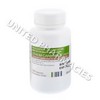Customers also like
Lithicarb (Lithium Carbonate) - 400mg (100 Tablets)
from only £20.49
Priadel (Lithium Carbonate) - 400mg (100 Tablets)
from only £27.81
Lithium Carbonate - 250mg (100 Capsules)
from only £18.37
Licab (Lithium Carbonate) - 300mg (10 Tablets)
from only £2.13
Lithosun (Lithium Carbonate) - 300mg (10 Tablets)
from only £2.64
Serenace (Haloperidol) - 1.5mg (100 Tablets)
from only £18.39
Description
| Main Use | Active Ingredient | Marketed Name |
| Depression | Lithium Carbonate | Lithicarb |
Uses
Lithicarb (Lithium Carbonate) is used as a medicine and mood stabiliser to treat patients affected by depression and bipolar disorder. It is believed to work by causing an increase in the action of certain chemicals in the brain which are responsible for sensing messages between the nerve cells and by reducing unusual brain activity. In some cases, it may be used alongside other antidepressant medicines.
Other conditions for which patients have used this medication include treating alcoholism, headaches, epilepsy, arthritis, seborrhoea, an overactive thyroid, Tourette's syndrome, ADHD, Meniere's disease, parasthesias, asthma, Huntington's disease and other conditions which have not been listed here.
Dosage and Administration
Lithicarb (Lithium Carbonate) comes in the form of 250mg tablets, and if you have been told by your doctor to take this medicine, it is important that you only take the amount prescribed to you. These tablets should be swallowed whole, with water. Do not break or chew the tablet. Taking too much lithium can be dangerous, and can lead to serious side effects. In order to avoid this, you should never take more lithium than your doctor directs you to take.
Side effects
Taking Lithicarb (Lithium Carbonate) to treat depression or other conditions may cause side effects, such as:
- Acne
- Shaky hands
- Dry or thin hair
- Taste sensation changes
- Sensitivity to cold weather
It is important to be aware that serious side effects may occur as a result of taking this medicine, although this is considered to be less common. You will need medical treatment immediately if you notice urinating more frequently than normal, thirst, speech problems, seizures, hallucinations or any other symptoms of a severe reaction.
Precautions
Before the commencement of treatment with this medication, your doctor may need to conduct a medical examination and blood test, to test your thyroid gland function. Other blood tests may be needed during treatment.
Special dietary instructions may be given by your doctor, such as telling you not to abruptly change the level of salt that your diet contains.
Seek immediate emergency medical attention if you suffer an allergic reaction. Symptoms to watch for, which may be indicative of a reaction, include skin rashes, hives, swelling of the face or limbs, trouble breathing, and trouble swallowing.
Always use Lithicarb (Lithium Carbonate) as you have been prescribed by your doctor. Never self-medicate or change your dosage without first consulting your doctor. The correct dosage can vary depending on your health, medical history, and the severity of the condition being treated.
This medication may not be safe for all patients. Before you begin using it always disclose the following to your doctor:
- If you are pregnant or breastfeeding.
- If you suffer from any allergies.
- If you suffer from any other health conditions or illnesses.
- If you are using any other medicine (including all non-prescription).
- If you are using any supplements, vitamins, or herbal products of any kind.


-Tab-250mg-UK-1.jpg)
-Tab-400mg-UK-1s.jpg)
-Tab-400mg-UK-1s.jpg)

-Tab-300mg-UK-1s.jpg)
-Tab-300mg-UK-1s.jpg)
-Tab-1.5mg-UK-1s.jpg)
-Tab-250mg-UK-1s.jpg)


